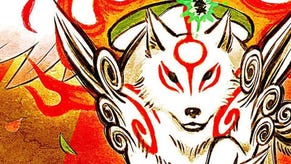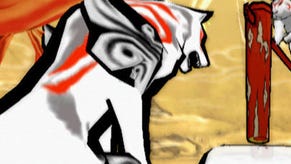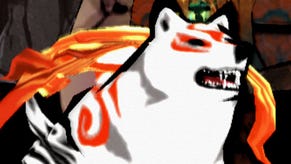Okami
A new dawn for the Sun God.
This shouldn't be happening. To quote from Kristan's review of Okami on the PlayStation 2: "Okami's ideas would have worked far better on the Wii, but that's never going to happen, now, is it?" And yet - marvellously, unbelievably - here we are, a year and a half later, playing Okami again in progressive-scan widescreen on the Wii, wielding the Celestial Brush again with a remote, despite Clover's closure and below-average sales. And Kristan was right - Okami's ideas do work better on the Wii.
The very basics of Okami's design are similar to the Zelda series' - indeed, this is probably the only truly great game outside of that series that has ever managed to pull it off so well. The story, like the visual style and striking music, draws its inspiration from Japanese mythology; playing as a legendary white wolf infused with the spirit of the sun god, Amaterasu, we go about saving the world from a great evil, albeit in a stunningly well-realised and visually entrancing way.
Okami's world is fairly open, and spreads gradually outwards as Amaterasu moves between beautiful outdoor scenes and bigger, puzzle-filled, delightfully inventive dungeons. Getting rid of the evil in a place by defeating dungeon bosses restores life and vitality to areas of the map in a breathtaking tidal wave of colour, foliage and wildlife. After that, the area is free to be explored; secretive corners of the map draw you to them with hidden items, side-quests and colourful, often humorous characters. The wealth of things to do outside the dungeon structure is quite amazing - even apart from the side-quests and exploration, there are wild animals to be fed, trinkets to collect and little residual pockets of darkness to take care of. The more you partake in Okami's world, the more it rewards you, slowly building up Amaterasu's wolfy abilities outside the dungeons as well as rewarding her with new weapons and techniques inside them. It is captivating design, complemented by fluid, gorgeous and unique visuals.
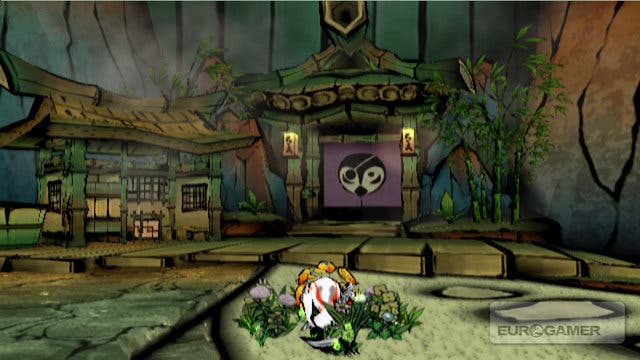
Okami's iconic concept is the Celestial Brush. Press the B button, and the whole world around Amaterasu freezes in time, transformed into a sepia-coloured ink-on-papyrus image that can be daubed with black ink for all sorts of effects. The Celestial Brush techniques start off simply - draw a big circle in the sky for a sun, make withered trees burst into bloom in a shower of blossoms, daub missing stars onto constellations, draw straight lines through things to cut them in half - but they become ever more inventive as the game goes on, and before long you're deftly forming lily pads beneath Amaterasu's feet with a mid-jump flourish of the Wii remote, or creating barriers of trees between her and an enemy. It's just as striking and impressive a visual technique as it is a gameplay mechanic, and it lies at the heart of what makes Okami so memorable; never before have a game's graphical style, music and gameplay been so perfectly integrated with each other.
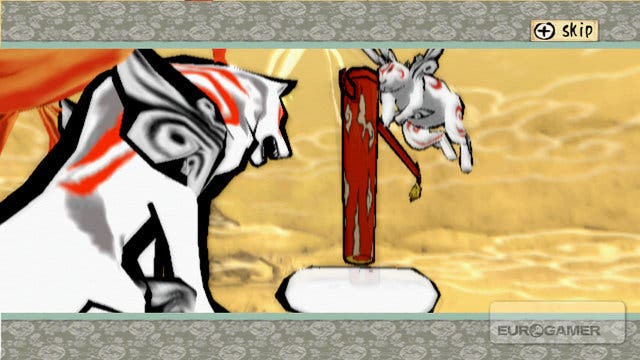
This whole business is much improved, as everybody knew it would be, by Wii remote controls. The ink-painting process is so much quicker and smoother this way. As before, you'll occasionally make a mistake by not drawing an acceptably straight line or drawing circles too large, but it's much easier now to try again without breaking the flow of the game. It actually improves Okami's pacing significantly - painting with a PS2 pad was a fairly laborious process, meaning that it often wasn't worth the hassle in combat, but now it's possible to switch so quickly between using the brush and ordinary gameplay that taking enemies out with a final slash is more convenient, and looks more stylish. It also feels more intuitive - which, considering that the Wii opens this game up to an audience that might never have seen anything like it before, is definitely a good thing.

